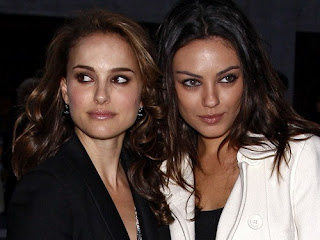Black Swan
By Moira Sullivan
Black Swan by film director Darren Aronofsky made its international film debut at the Venice Film Festival this summer and opened to mixed reviews by critics. Most definitely actress Natalie Portman is a strong contender for an Oscar this year, in what may be one of the defining roles of her career. She is absolutely brilliant in the film. Her role requires her to be the Swan Queen in a new ballet. Amidst stiff competition Nina Sayers is chosen to do the part convincing ballet director Thomas Leroy played by Vincent Cassel that she can play the more difficult black swan by biting him on the lip as he tries to kiss her.
The screenplay of Black Swan is the major problem of the film written by Mark Heyman and Andres Heinz with only a couple of film credits to their names. One needs to question why Aronofsky would want to put his name to a story in which women are still living at home in their bedrooms filled with white and pink stuffed animals and calling their mothers "mommy". Mommy, the excellent Barbara Hershey, a woman who gave up her career to have Nina, plays Erica Sayers. We know that the ballet world is difficult for one is retired as early as 30, as we witness when the primadonna ballerina Beth played by Winona Rider is eventually put out to pasture after years of being the mistress of the maestro.
Stealing the words of the Russian founder of the Ballet Russes Sergei Diaghilev, Thomas asks Nina to “surprise us” for her role as the Swan Queen. The white swan he says he knows she can do but in order to play the black swan, he asks her to "touch herself" at home and seduces her while practicing to get her to "let loose". At last she agrees to accompany pushy Lily, her stand-in played by Mila Kunis, who entices her into taking an hallucinogen. Nina winds up in the bathroom with a strange man and later is that Lily in her bedroom? ( The first sexual experience for Nina in her sequestered life, real or not). The rivalry between the two women is exploited by suggesting it is all in Nina’s mind but it is predicated on who will sleep with Thomas, a lesson Beth learns is a fleeting reward when she is "retired".
Stealing the words of the Russian founder of the Ballet Russes Sergei Diaghilev, Thomas asks Nina to “surprise us” for her role as the Swan Queen. The white swan he says he knows she can do but in order to play the black swan, he asks her to "touch herself" at home and seduces her while practicing to get her to "let loose". At last she agrees to accompany pushy Lily, her stand-in played by Mila Kunis, who entices her into taking an hallucinogen. Nina winds up in the bathroom with a strange man and later is that Lily in her bedroom? ( The first sexual experience for Nina in her sequestered life, real or not). The rivalry between the two women is exploited by suggesting it is all in Nina’s mind but it is predicated on who will sleep with Thomas, a lesson Beth learns is a fleeting reward when she is "retired".
Mila Kunis was given the Marcello Mastroianni for best emerging actress by the Venice jury, who rewarded Kunis for her portrayal of a drug using outspoken and sexually liberated woman from San Francisco, and the nominations continue for Portman and Kunis including Oscar nods. But it is not only sexual openness that is required of Natalie Portman’s character, she must endure nightmares of self-mutilation. Its enough to know that women in ballet severely injure their feet by dancing on their toes in pointe shoes and twirling in their tutus whereas men get to use their entire feet and leap and lift women in the air. By far the work of women is the most excruciating in the film, and it’s refreshing to have this emphasis but how Aronofsky tells this tale is at too high of a price. Can it be that the work of a prima donna ballerina is just plain torture? This film says so. This is not a film of the occult but the story of how a young girl who is raised to be perfect and chaste which is of course her mother's fault, and how she winds up being a frigid ballerina waiting for the role of the black swan to help her evolve. The story is clichéd and explains the mixed reviews at Venice. Watching Portman at work despite the role she is given is worth the 1. 50 minutes.
For Movie Magazine this is Moira Sullivan, Venice.
© 2010 - Moira Sullivan - Air Date: 12/27/10
Movie Magazine International
Movie Magazine International

Excellent article..
ReplyDelete